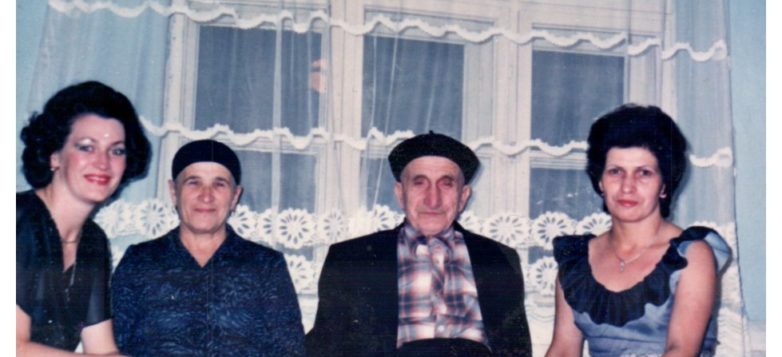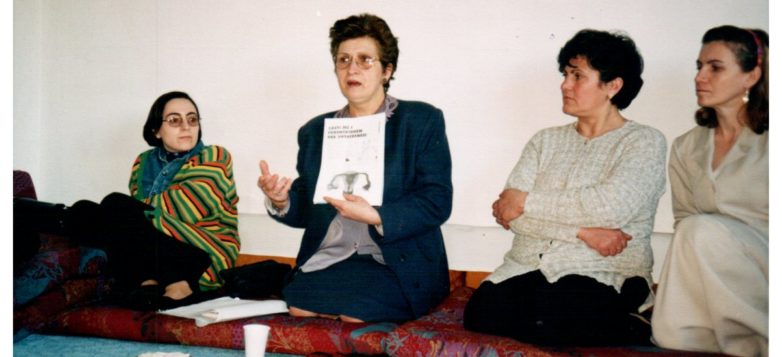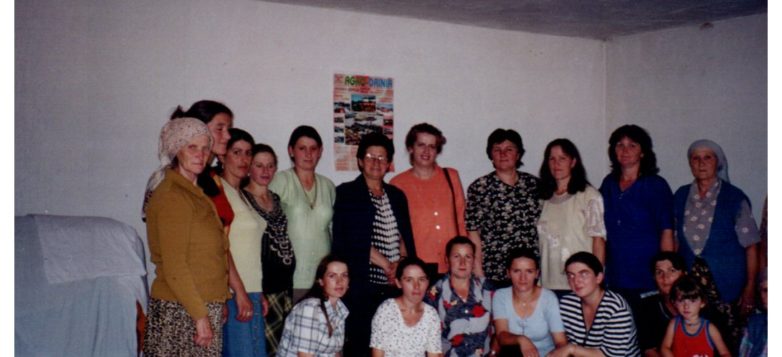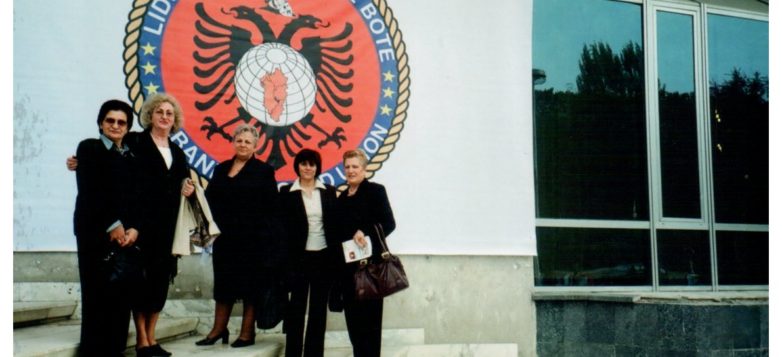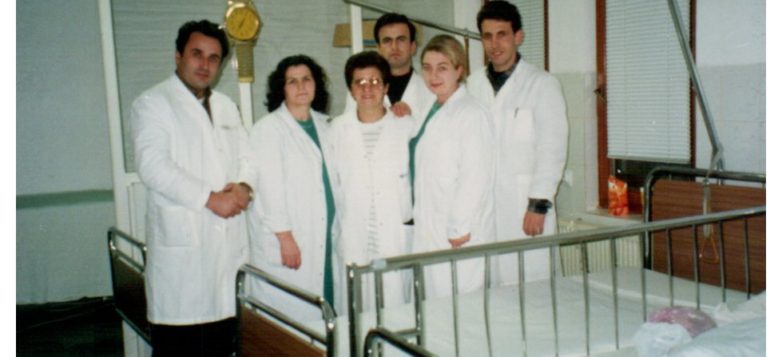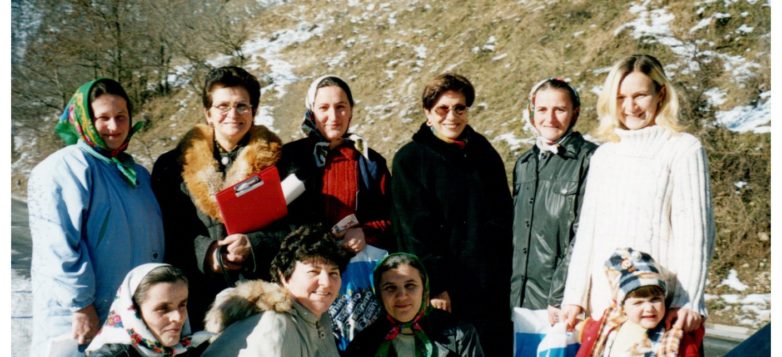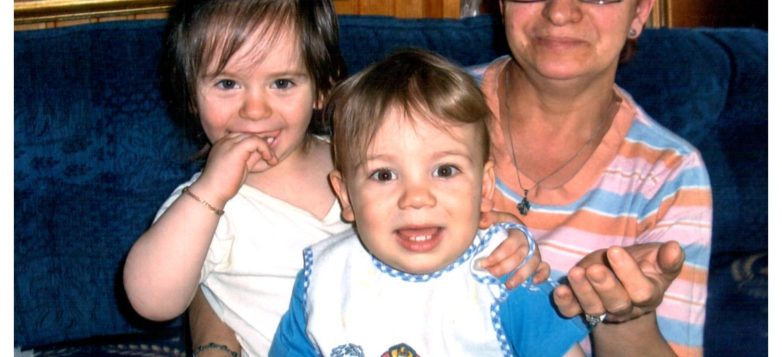Professional Life
Jëlldëze Gorani: Work was often done through improvisation. Lack of gloves, lack of tables, crowded mess among patients, high demands, little possibilities, small number of beds, so all this in general presented difficulties. But during my specialization I didn’t have any difficulty, maybe because I loved this craft, maybe it is because of that. The biggest difficulty was later, when I finished, then after the death of doctor Ramiz, the other doctor who was Macedonian died also and I was left alone. Occasionally there was another Macedonian there, but he left the department, he said that he wasn’t able to handle it, so he was going to leave, so I was left alone. That was very difficult to handle, because you couldn’t know everything, I mean, when you compare surgery with other medical fields, it could be like fire, for obstetrics is like flames. To arrive at that point, it is an emergency. You had to be fast there, to be exact and dedicated.
So there, while I was alone, understanding that the job done alone was difficult was a problem. It was impossible to handle it physically. You had to… calls lined up one after another, they were emergencies, surgeries, births, and they too were urgent. But the routine things as well had to be necessarily done, for example patients’ visits, interventions that are handled every day, abortions and examinations.
Then there was an intervention, a doctor from Gjilan was brought in, and he was Ramadan Maliqi. So he took the responsibility for half of the month, and I had the other half of the month, it was easier to handle, until our doctors who were in the specialization came from Prizren. Then work became easier. However, the difficulty of the work in our department increased due to the political situation, we lacked many things: blankets, sheets, medication, thread, gloves, everything was on the verge of poverty. You had to deal with it and with the financial shortages that we had in our department. I remember some women who had the courage at the time to act. We were in that… they were Edita Tahiri, her sister Shyhrete, and some others, I can’t remember now, maybe I am doing an injustice. We gathered and went to organizations, we collected money and deposited that money in the bank to be able to buy necessary things for the hospital with that money.
Dua Dauti: What year was that?
Jëlldëze Gorani: This was when I was alone, but the specialists had started coming before the 1990s.
Dua Dauti: So you voluntarily went to collect money?
Jëlldëze Gorani: Yes, we went and we collected money. We went to different organizations, factories, even to the private firms, there were retired people, people had willpower to help.
Money was collected, deposited in the bank and from that money we bought a lot of things, for example, beds and other necessary needed things like sheets, blankets, medication, we bought it all for the department. At the end we had some left over money so we bought an incubator, a mobile incubator for the premature children who had to be transported to some other center, where they could be treated better, because our conditions did not offer a chance for their survival. But the transportation was very difficult because they had to have an optimal temperature, and that very special care would have been possible only thanks to this apparatus. In the meantime, they fired me from my job and this incubator was left behind. It was ordered from Belgrade and remained there, then they notified me that it was ready, and so we got the equipment. So, we thought not to give it to the department, since they removed the majority of us doctors, and thought that we would return the equipment.
One day the police of the time surrounded my ambulatory, I don’t know how many of there were, but there were policemen in the yard, inside the ambulatory, on the street, inside the house and one soldier was with them. They threatened us and wanted us to give the equipment to them, we were upset, not that we needed that equipment, but why would they remove us, when almost none of our doctors were working there. There was…but not all. So they took the equipment. I had the equipment at my brother’s because it was pretty big, he lived alone and had space where he could keep it safe. They went and took the incubator but they also took my brother, so they could question him, naturally to interrogate him, there was a difficulty there, I had to plea with them to free my brother because he was not guilty of anything. Then he was freed, and they didn’t have any reasons to keep me there, they took the equipment. What I mean, that was a kind of oppression from the regime of that time to make things more difficult. I must say this, we were forced to ask for signature, I mean in the organization, that was the hospital requirement, but in these circumstances to improve work was not possible. Then another difficulty came when they fired me from my job.
Dua Dauti: So you mean they fired you from your work once, then came…Can you explain how did this happen, how did they tell you, was it a process of firing you from work, or firing others? Most likely, it wasn’t just you…
Jëlldëze Gorani: The whole atmosphere was something like that, like they were going to get me, to undertake something to remove us.[1] But we believed that they didn’t have the reason to remove us, for what reasons? I remember that day. It was August when I had returned from vacation, after half an hour of work, I had a small intervention on a mother, and another intervention, when they gave me the notification of having to leave my job. They removed me then by force from my supervisory job, they brought another Serbian doctor, and she told me that I had to leave, or the police would come. And indeed, I was called by the directorate downstairs, two policemen had come, and they addressed me for making trouble at the hospital so I had to leave.
Dua Dauti: What was the content of the decision, what did they offer you?
Jëlldëze Gorani: I don’t remember now what it was, but I did ask the director, I said, “I want to know the reason! For what reason? Did I do anything to a patient, or any other injustice, did I make any mistake by law?” There was a lawyer there. “No,” he said, “there is no mistake.” Then he said, “Ti si bila bezprekorna, moraš da ideš [You made no mistakes. But now you have to go]. You have to go.” Then, the policemen turned to him and said, “Why did you call us then when she does not need to be fired? Why did you call us?” He said, “She has to be removed.” Then I turned to the policemen, “Just two minutes until I get some…I will change and leave.” And that’s what happened. I left.
Dua Dauti: Were you the first in the department to…
Jëlldëze Gorani: Yes, yes I was the first. It was known, of course I consulted the lawyer, since this was a legal matter, “Can you tell me what’s this?” He was silent and didn’t answer at all. I told him that I would tell him why I was being removed. Since I have this name I am being fired, but if I were Zvezdana [a Serbian name] then they would give me a piece of paper that it would be all right, I will not be fired. The policeman said, “You are doing politics here.” I said, “Yes, it is politics, it is nothing else, it’s only politics that is firing me.” I walked out, then I continued privately in my clinic, but they didn’t let me be in peace, they did not leave me in peace even there. They did not let me be, because they began to be impressed by, for example, the name of the clinic that was not written in Cyrillic. They came from the municipality, saying that I had to write it in Cyrillic because all the companies in town, 90% of them, were like that, so I said, “I would like to be 10% and not 90%, but 10% if there were any…So let it be.” There were patients there and froze, one of the patients said, “Are we bothering you, maybe we should leave?” Because she [the patient] came unexpected. “No” I said, “You are not a bother, but he is bothering me.” So he went back angry saying, “Since we are bothering you, then you are going to go to court,” and it happened. But the judge couldn’t do anything, I was freed because they had no right to place such demands on me. So I was not sentenced a fine, but the judge was not a Serb, he was a Muslim, he was Bosniak. He looked at justice as it was, and didn’t distort it.
Dua Dauti: Was it the same year when you were removed from work…
Jëlldëze Gorani: Yes, yes it was 1991.
Dua Dauti: So, the moment you were removed from work, you opened the clinic and continued working?
Jëlldëze Gorani: Yes, yes.
Dua Dauti: During the work at the clinic, were there other difficulties besides the case you mentioned…
Jëlldëze Gorani: Until that regime lasted there were difficulties, for example when inspections came, they would find problems with documentation, or other things. For example it would bother them that the documents were in Croatian, the objective was to cause a problem, I understand. But this does not qualify as a problem, it is not a problem, whether it is written in this or that language. They saw that as a problem. Or one time, for example, I will never forget, “No, you will open another door here.” Or another time, “No, close this one, there should be no communication with your home.” There was no reason, all the time they made these requests.
Dua Dauti: Mrs. Jëlldëze, you have been awarded a prize, and can you explain what for have you been awarded?
Jëlldëze Gorani: It was interesting, those awards, acknowledgments, I don’t really mention them, the biggest acknowledgment for me comes from the patients (smiles). That makes me happy. This award was for my good work. So, I went there to get it, and it is interesting there was a professor and his question was, “How long have you been there in Prizren?” I said, “I am by myself.” He said, “How does your government allow you to work?” I think there, he was right, because a human being is a live being. Everything possible could happen to a human being. For example, during the surgery one can die, for example one can get into hypoglycemia, one’s blood sugar is low, and it wouldn’t be possible to continue the surgery. I conducted my surgeries with nurses and midwives, it was not allowed, by I had no other choice.
Dua Dauti: So what years were you in Belgrade?
Jëlldëze Gorani: Before 1990s, it was 1986 maybe. In 1987, I was in Slovenia in order to master a surgery technique in a more natural way, not through the abdomen, but in the abdominal way. That was a great lesson, and being treated like a human being is really satisfactory. Their intellectual, academic behavior, was a big deal. Work started at seven thirty in the morning and ended at seven thirty in the evening, with only thirty minutes break for lunch and everybody back at work. But the benefits were great. But I didn’t get to work a lot there, only about four years.
Dua Dauti: I mean, you worked in Slovenia, yes?
Jëlldëze Gorani: No. It was, how to put it, it was only training. Medicine does not remain still, it has its development, new information, so one needs to continue, to learn something else, something better, another change for us to implement at work. Such where the possibilities then, and because of the staff, because I was alone, but the possibilities were different, because of the situation, more so for a doctor of another nationality, but I was alone and I could take this, after new colleagues came to the department, I was able to go.
Dua Dauti: Let us go back in time, when for example, it is very interesting for us to know how, as a very well-known doctor, how did you experience the moment that we are now talking about, an important award that you received in Belgrade, and four-five years later you were removed from your job by people of the same nationality. What were your emotions at the time? How did you experience the time, from a successful doctor that you were, succeeding in your career, you were alone, you had a lot work, and then comes the moment of separation.
Jëlldëze Gorani: All that mistrust then, even though I never knew how to hurt any patient, whoever they were, whatever nationality they were. For me they were patients, and I helped them with all the dedication, all the capacity that I had. I never expected a thank you, I didn’t expect it because that was my duty. However, this is how you are rewarded, that was, how to put it, it was a big punch. But it is no surprise to receive that from that kind of regime, it is not a surprise. They were thinking differently, but I am happy that the outcome was not what they expected, it didn’t come to be.
Dua Dauti: During your work in the hospital, before your removal, did you have any problem or difficulties with other doctors who were not of another nationality?
Jëlldëze Gorani: No, no! In other departments not at all, no. It was the leadership who didn’t behave well, but also the colleagues whom we mentioned in the beginning, but later no, they were not bad. When I returned as a specialist, even the doctors of the other nationality in this obstetrics department were fair and different.
Dua Dauti: I mean, there was no reaction or something, while the situation worsened?
Jëlldëze Gorani: Yes, yes.
Dua Dauti: Let’s talk about difficulties at work in the 1990s, those which were presented as political difficulties that we mentioned a little, so you had different types of pressure from the police, as you said. You mentioned two, three cases. But other difficulties, how did you maintain the office with all those material difficulties?
Jëlldëze Gorani: I have no knowledge, after I left, of the situation in the department, like that…
Dua Dauti: I am talking about your clinic…
Jëlldëze Gorani: Ah that, in my clinic things were fine, I tried to do something. For example, our students were learning in private homes, especially high school students, nurses and midwives. They finished their residency with us, that was a satisfaction, that I could offer something. There were also doctors who completed their practical work here with me, because they didn’t have the right to complete their residency in the hospitals at the time. Supposedly they finished their education from unaccredited institutions in Pristina. Even the colleges organized their work in private homes, which is why they didn’t accept them in the department, so they went to private clinics, finished their residency. There were also students, I mean, I also had students. There were also doctors in specializations, and doctors who had finished college, they completed their residency here, but also high school students.
My removal from work was, I think the government wanted to remove witnesses from what was going to happen at work, also to remove us from the workflow because people had expectations from us. Then, we had to improvise in my private practice and with this I felt that I was able to do something for the patients. Then I got involved with the clinic Nëna Terezë[2] in Arbana. I worked there during the entire time, until the war was over and I was on the night shifts at the hospital Nëna Terezë in Pristina. My experiences vary quite a bit, especially since it was a greater responsibility, with greater anxiety, with greater fear, a greater job than in the Nëna Terezë hospital. We were forced to fight for every red blood cell, we were afraid that some woman might have bleeding because the process of birth is always followed by bleeding, and the issue of blood transfusion was a difficulty. That [the blood transfusion] wasn’t in our hands, that functioned in the hospitals, that was in their hands, i.e the Serbian regime.
Technicians who determined the blood, the blood type, and enabled the transfusion, existed, but the conditions were very difficult, and we avoided these interventions because blood transfusion is like surgery or like the transplant of an organ. So blood itself represents an organ for the human body. It was difficult to see patients who… you would feel touched when the children came on behalf of their families to pick up the women with their babies. That poverty… they would wrap babies in their swaddling clothes, their feet would show because the clothes were ripped off, old, and the women were anemic, and malnourished. All this left a heavy impression about people’s circumstances. But people’s actions didn’t stop, these later culminated with the appearance of the KLA [Kosovo Liberation Army] soldiers, who fought.
They begun the war in February 1998, I had the opportunity to see their wives, their mothers who came for appointments, and to hear their sorrows. When a mother said, “I don’t know where my son is, I wonder if he has a drop of water to drink?” (cries) those moments were very difficult. Personally a person cannot boast that one has achieved something without the help of the rreth. However, I think, the freedom that I won, the support from my parents and the rreth, who helped me a lot with my education, I consider that an achievement. Another difficult work period for me was when I was left alone in 1984. At the time, not only was I left in a difficult position, since I was left alone in the department, but I was also concerned with women’s health. At the time, two good people helped me and they saved the department, they understood that gynecology was a pillar of health, without which the hospital couldn’t exist. They were Mrs. Hyrmete Qipa and Mr. Besnik Dauti. With their contribution this problem was solved, and I felt relaxed and able to act, and able to work.
My other achievement, I am a mother of two wonderful children, who represent the meaning of life for my husband, my life partner, and me. Also, I have five grandchildren who are an elixir of life. They make my life beautiful, they give motivation to my work. A single greeting is enough, a single smile of theirs, a single hug of theirs, for me the whole day is beautiful, and all life is beautiful. These are…
Maybe in the end, [I have] a short message that I would give to every young man or young woman who takes the direction of healthcare, medicine, especially in women’s health, since that represents half of our population. Women contributed a lot to history and the recent history. We had women who have been active even in war, but also helped with washing, sowing the KLA soldiers’ clothes. Even more so, women were threatened with knives, there are about 20 thousand who have been raped, who now live on charity and this really hurts me, this government should offer them material and human support. So the young people who take this direction must care of caring for women, I would want them to do this with a lot of dedication and willpower, because it is difficult. But if they love the profession, then they would think only about [women’s] illness, not money, but women’s health. This will be their best and the most enjoyable compensation.
[1] By 1991, after Slobodan Milošević’s legislation made Serbian the official language of Kosovo, Albanians were removed from public service jobs.
[2] Mother Theresa, the self-help organization that during the 1990s, at the height of Milošević’s repression, supported the parallel society of Albanians, expelled from all state institutions and services.
